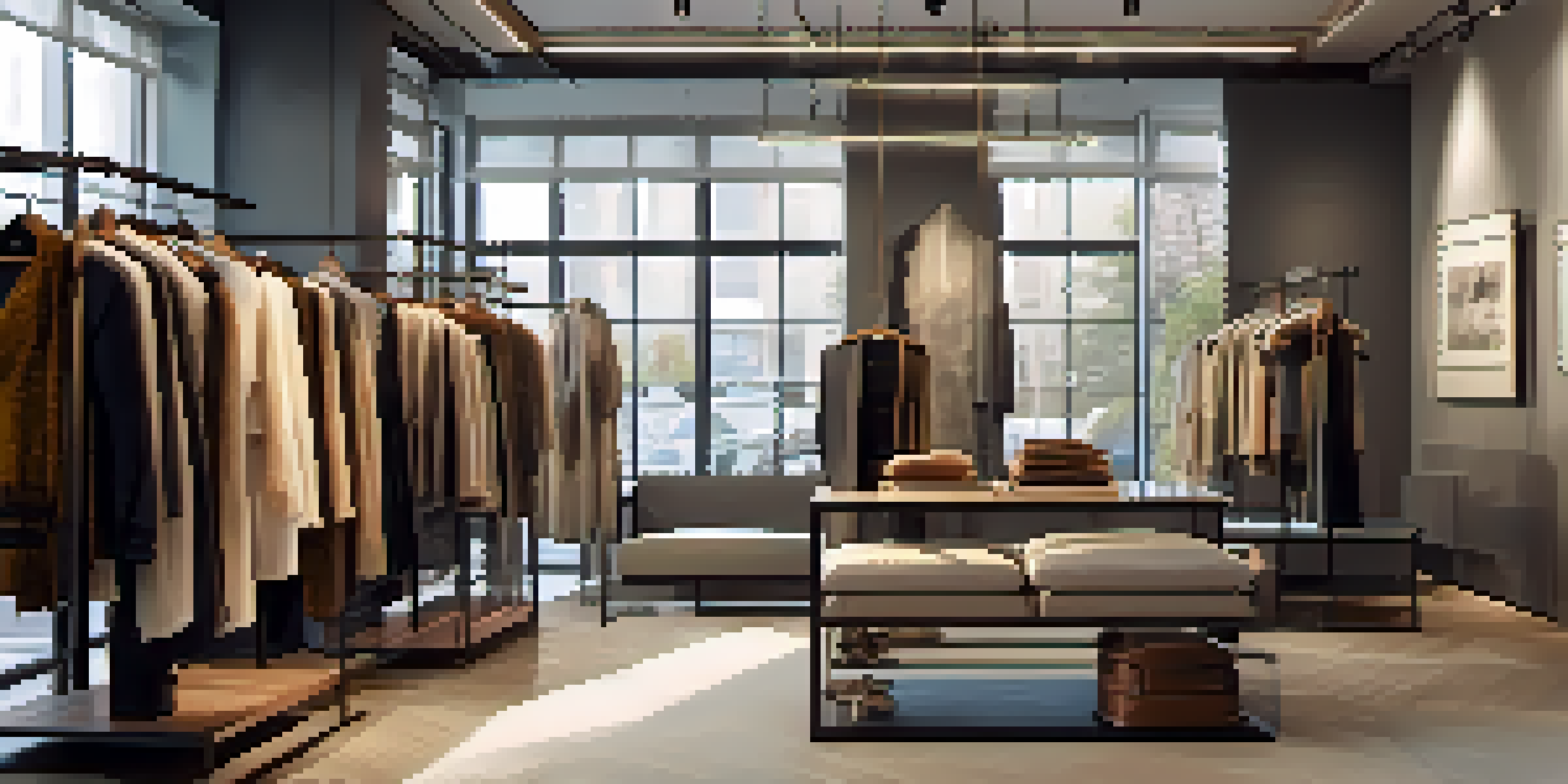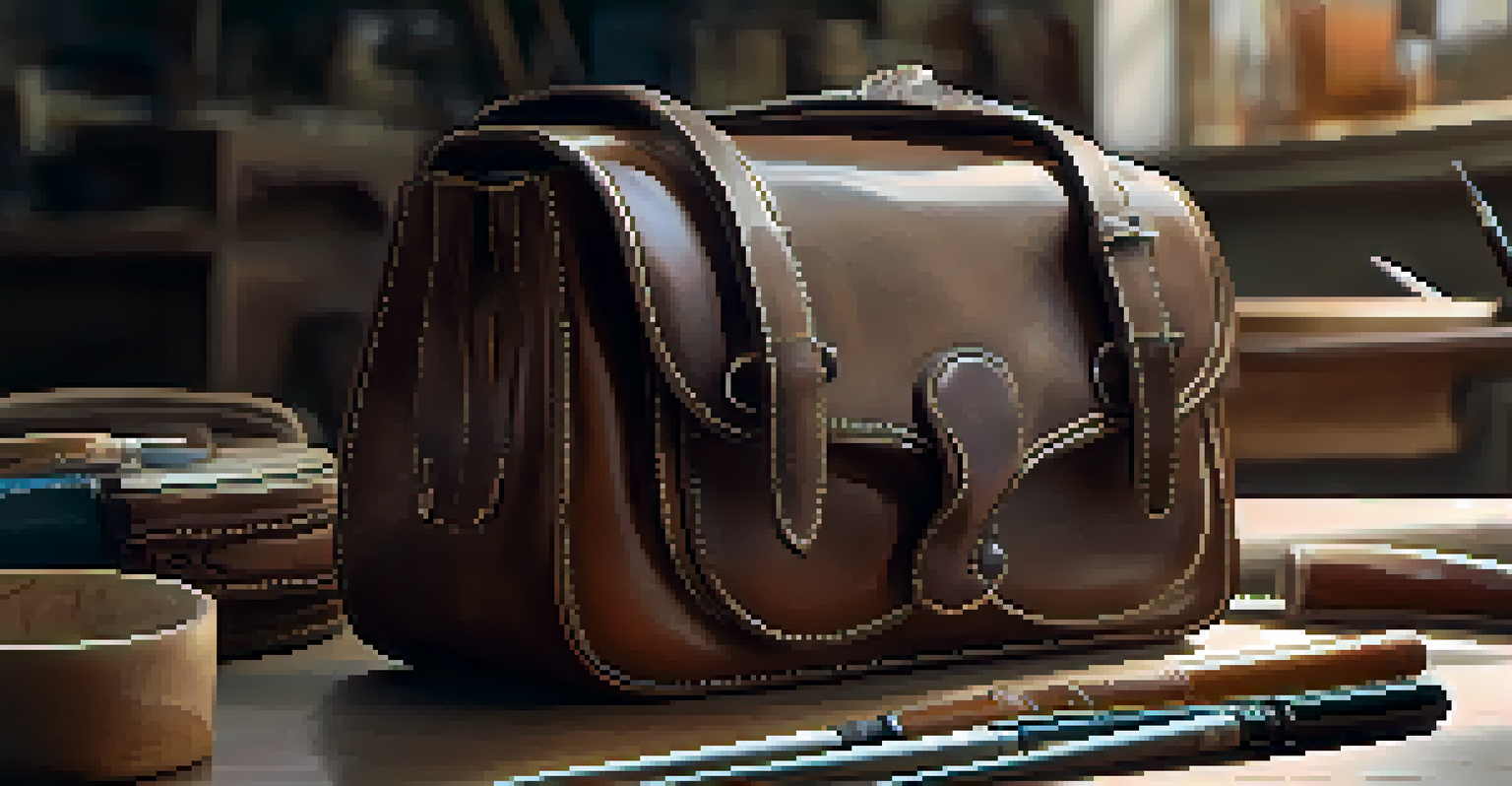The Ethical Dilemma: Sourcing Materials for Luxury Fashion

Understanding Luxury Fashion and Its Material Sourcing
Luxury fashion is often associated with high-quality materials and craftsmanship, but this raises important ethical questions regarding how those materials are sourced. Designers seek the finest fabrics, leathers, and embellishments, which can often come from controversial sources. Understanding the origins of these materials is crucial for consumers who want to make informed choices.
Fashion is part of the daily air and it changes all the time, with all the events. You can even see the approaching of a revolution in clothes. You can see and feel everything in clothes.
For instance, exotic leathers may be sourced from endangered species, sparking debates about sustainability and conservation. Similarly, the production of certain fabrics can involve harmful environmental practices, affecting both local ecosystems and communities. As consumers become more aware of these issues, the demand for transparency in the supply chain grows.
This has led to a shift in the industry, pushing brands to find ethical alternatives without compromising on luxury. Brands are increasingly exploring sustainable materials, such as organic cotton or recycled fabrics, and incorporating ethical practices into their sourcing strategies. Understanding these dynamics is the first step toward addressing the ethical dilemma in luxury fashion.
The Impact of Fast Fashion on Luxury Brands
Fast fashion has drastically changed the landscape of the clothing industry, creating a culture of rapid consumption. This model, characterized by low prices and quick turnaround times, pressures luxury brands to redefine their sourcing strategies. As consumers gravitate toward more affordable options, luxury brands face challenges in maintaining their exclusivity while ensuring ethical practices.

With the rise of social media, consumers are more informed than ever about the origins of their clothes. They are increasingly seeking brands that align with their values, pushing luxury labels to address sustainability and ethical sourcing. This shift requires luxury brands to not only highlight their craftsmanship but also to showcase their commitment to responsible sourcing.
Ethical Sourcing in Luxury Fashion
Luxury brands are increasingly prioritizing ethical sourcing to meet consumer demand for transparency and sustainability.
However, the challenge lies in balancing these ethical considerations with the brand's identity. Luxury brands must navigate the fine line between tradition and modern consumer expectations, often leading to innovative approaches in sourcing materials that cater to both quality and ethics.
The Role of Transparency in Ethical Sourcing
Transparency is becoming a vital component of ethical sourcing in luxury fashion. Brands are now expected to disclose where and how their materials are sourced, ensuring that consumers can make choices aligned with their values. This shift towards transparency fosters trust between consumers and brands, encouraging a more ethical buying culture.
The greatest luxury is being able to take time for yourself and your values.
For example, some luxury brands now include detailed information about their supply chains on their websites, highlighting their commitment to ethical practices. This includes information about the materials used, their origins, and the conditions under which they are produced. Such transparency not only benefits consumers but also encourages other brands to adopt similar practices.
Moreover, transparency can serve as a powerful marketing tool. By showcasing their ethical practices, luxury brands can differentiate themselves in a competitive market, appealing to a growing segment of conscious consumers looking for authenticity and responsibility in their purchases.
Sustainable Materials: The Future of Luxury Fashion
The luxury fashion industry is increasingly turning to sustainable materials in response to ethical concerns. This includes innovative options like bio-based fabrics, recycled materials, and organic textiles, which reduce environmental impact while maintaining the luxurious feel that consumers expect. Brands are experimenting with these materials to create elegant, high-quality pieces that tell a story of sustainability.
Take, for instance, brands that use recycled ocean plastics to create fashionable items. This approach not only reduces waste but also raises awareness about ocean pollution, making a positive impact on the environment. By using sustainable materials, luxury brands can appeal to eco-conscious consumers while staying true to their commitment to quality.
Fast Fashion's Influence on Luxury
The rise of fast fashion pressures luxury brands to adapt their sourcing strategies while maintaining exclusivity and ethical standards.
However, integrating sustainable materials into luxury fashion isn't without challenges. Issues like sourcing consistency, production costs, and consumer acceptance need to be addressed. Yet, with the right strategies, luxury brands can pave the way for a more sustainable future that resonates with modern ethical values.
The Importance of Fair Labor Practices
Beyond material sourcing, ethical considerations in luxury fashion also encompass fair labor practices. The production of luxury goods often involves skilled artisans and laborers, and it's crucial that they are treated fairly and compensated adequately. Brands must ensure that their supply chains promote safe working conditions and respect workers' rights.
Brands that prioritize fair labor practices not only uphold ethical standards but also enhance their brand reputation. By investing in the welfare of their workers, they can create a more sustainable business model that resonates with consumers. Moreover, this commitment can lead to higher quality craftsmanship, as skilled workers take pride in their work.
However, ensuring fair labor practices requires diligence and ongoing monitoring of supply chains. Brands must engage with workers, implement training programs, and conduct regular audits to maintain ethical standards. By committing to fair labor practices, luxury fashion brands can build a more ethical and sustainable industry.
Consumer Responsibility in Ethical Fashion Choices
Consumers play a critical role in the ethical sourcing dilemma in luxury fashion. As the demand for transparency and ethical practices grows, consumers are encouraged to ask questions about the origins of the products they buy. This proactive approach empowers them to make choices that reflect their values and support brands committed to ethical sourcing.
For instance, consumers can seek out brands that prioritize sustainable materials and fair labor practices, while also being willing to invest in quality over quantity. This shift in mindset not only benefits the environment but also helps to foster a culture of accountability within the fashion industry. By supporting ethical brands, consumers contribute to a positive change.
Consumer Role in Ethical Choices
Consumers play a crucial role in promoting ethical practices by supporting brands that prioritize sustainable materials and fair labor.
Moreover, consumers can share their knowledge and advocate for ethical practices within their networks. By spreading awareness about the importance of sourcing materials responsibly, they can influence others to make informed choices. Ultimately, consumer responsibility is a powerful force that can drive the luxury fashion industry towards a more ethical future.
The Future of Luxury Fashion: Balancing Ethics and Elegance
As the luxury fashion industry continues to evolve, the challenge of balancing ethics with elegance remains at the forefront. Brands must navigate the complexities of sourcing materials responsibly while maintaining the high standards of luxury that define their identity. This balance will require innovative solutions and a commitment to sustainability.
In the coming years, we can expect to see more luxury brands embracing ethical practices at every stage of production, from sourcing to manufacturing to marketing. This shift will not only cater to the growing demand for sustainability but also enhance the overall value of luxury goods. Consumers will increasingly seek out brands that align with their values, making ethical sourcing a key differentiator in the market.

Ultimately, the future of luxury fashion lies in its ability to adapt to changing consumer expectations while upholding the principles of quality and craftsmanship. By prioritizing ethical sourcing and sustainable practices, luxury brands can create elegant products that resonate with conscious consumers, paving the way for a more responsible fashion industry.